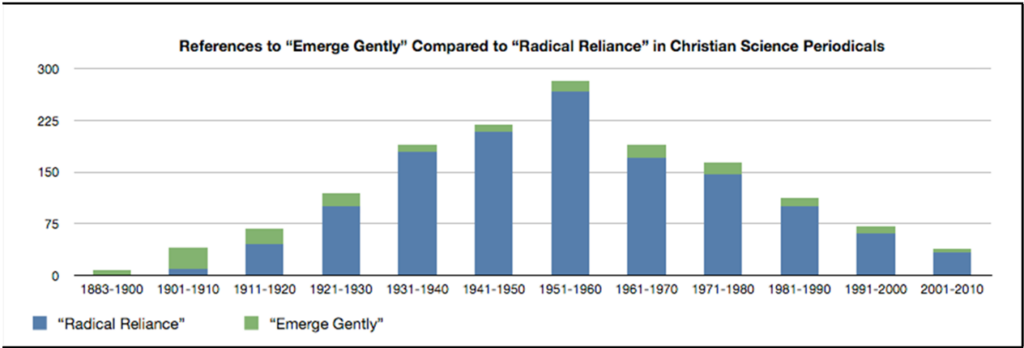by Keith McNeil – Hawthorne Publishing, “Winds of Change”
(Reprinted with permission)
How Biographical Treatments of Quimby and Eddy Have Influenced the Debate

In Eddy’s day, the ratio of references of “emerge gently” compared to “radical reliance” in the above periodicals was almost 4:1 in favor of “emerge gently”—whereas in the decade that followed her death, it had reversed, to just over 2:1 in favor of “radical reliance.” By the decade 1951-1960, that ratio had dramatically increased to almost 18:1. In the decade 2001-2010 the ratio was down to 5.5:1, but it still represented a ratio that was inverted from the one that applied in Eddy’s day. While too much should not be made of such simple word checks, it is clear that the term “radical reliance” has taken on, after Eddy’s death, a currency much stronger than when she was alive when compared to its putative opposite term, “emerge gently.”
As we saw earlier, in 1902, Eddy wrote a word of caution to her followers after a Christian Scientist, John Lathrop, was put on trial for a case where a child patient, Esther Quimby, had died. Amidst the press furor that followed, Eddy wrote:
Christian Scientists should be influenced by their own judgment in taking a case of malignant disease. They should well consider their ability to cope with the claim, and they should not overlook the fact that there are those lying in the wait to catch them in their sayings; neither should they forget that in their practice, whether successful or not, they are not specially protected by law. MY 227:14
That admonition has tended to be viewed by some Christian Scientists as only a temporary defensive statement by Eddy in response to a serious legal challenge to her religion at a specific point in time; nonetheless there is no record of that cautionary advice having an end stamp or time limit1. Her simple statement that the Christian Scientists should consider their ability to cope with the claim is more along the lines of “emerge gently” than “radical reliance.” [Page 329]
1 That the editors of the Christian Science periodicals did not think the article had a time limit is seen in the fact that they reproduced the article in its entirety in the February 4, 1911Christian Science Sentinel., a few months after Eddy’s passing.
https://ppquimbymbeddydebatedotcom.files.wordpress.com/2017/01/ppq-mbe-book-chapter-1.pdf
In his article: “Honesty and Temporary Means”, published on this website, J. Denis Glover wrote:
“Let’s look at that word, ‘radical.’
“A friend of ours studied classics at Oxford University, and I queried him once about it. I learned the connotation had changed considerably in the last century to become “extreme,” but he told me that the word actually derives from the Latin “radix,” meaning “root.” We find this usage in a word used by Shakespeare, “deracinate,” meaning “to pull up by the root.”
“I checked on-line and found other definitions: “an underlying support,” “basic,” and, of course, “arising from or going to a root or source.”

